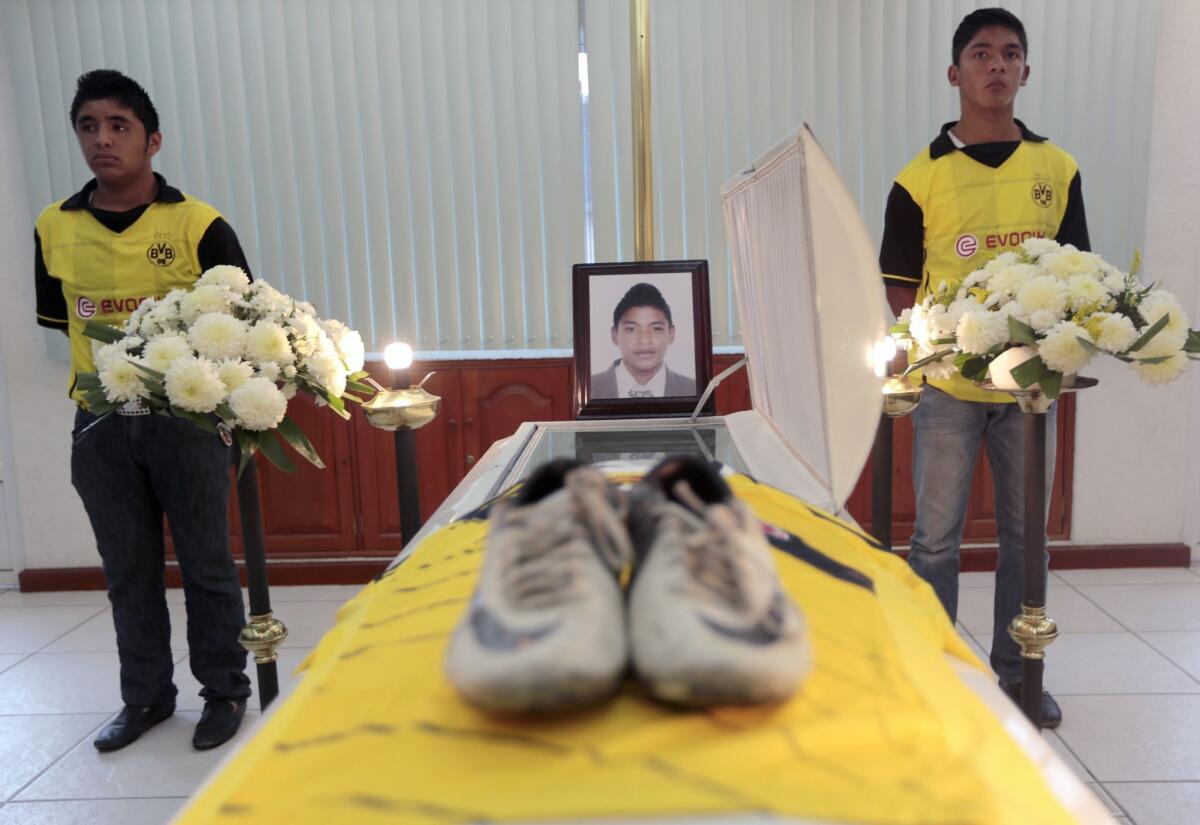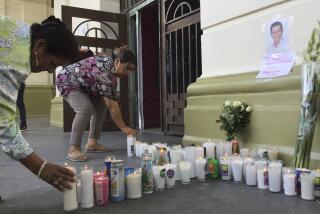22 Mexican police officers held in killings

- Share via
Reporting from Mexico City — Authorities said Monday that they had arrested 22 police agents in the weekend killings of six students and others in the troubled state of Guerrero, one of several incidents that also left 25 people injured and more than 50 presumed missing.
It is the second arrest in less than a week of members of government security forces suspected of illegal killings. An army officer and seven soldiers were detained Thursday in connection with the June 30 shooting deaths of 22 people, among them a 15-year-old girl.
It also came during a particularly violent weekend that left 13 other people dead, including a state political leader gunned down in an Acapulco restaurant.
The Guerrero state government said in a statement that 280 municipal police from the town of Iguala were questioned about the killings of the six students late Friday and early Saturday. All but 22 of the police were released without charges.
Iñaky Blanco, state prosecutor for Guerrero, said at a news conference Monday that police had undoubtedly used excessive force. “There is no justification for the use of firearms,” he said.
The violence began after students who were planning a protest over a lack of jobs seized several buses in Iguala, about 60 miles south of Mexico City, and police intervened to stop them. Most of the dead and injured attended a rural university, but a youth soccer team, the Hornets, was also caught up as the violence spread. In a later attack, a 15-year-old soccer player was among those killed. It was not clear who the armed assailants in that attack were.
Blanco quoted surviving members of the soccer team as saying they could not identify their assailants, who intercepted a bus they were riding home from a game. “They were screaming at the attackers that they were soccer players, but [the gunmen] responded they didn’t care and … opened fire,” Blanco said.
Seven witnesses to the earlier violence identified the attackers as police, Blanco said. A number of the detained police acknowledged “shooting in the air” but said they hadn’t killed anyone, he added.
The investigation, Blanco said, will also focus on Iguala Mayor Jose Luis Abarca, who spent much of the day batting down demands that he leave office.
As many as 57 students were reported missing by a school union, the Students Committee of Ayotzinapa. The state government said it was coordinating a search for “the presumed disappeared.”
El Sol, a newspaper in Acapulco, quoted students who survived the attack as saying they saw about 40 of their companions being taken away by police.
On Monday, students and teachers from numerous rural schools marched through the Guerrero capital of Chilpancingo to demand justice and a thorough investigation. The schools are part of a chain of public schools that were formed in part to provide education in remote parts of the country and to train future teachers. They are known as escuelas normales, “normal schools,” and the students normalistas. They are often at the head of protest movements.
“Unfortunately ... this isn’t an isolated case, even with the students of Ayotzinapa,” said Maureen Meyer, senior associate for Mexico at the Washington Office on Latin America. “Police abuses in Mexico are far too common, and they almost always go unpunished.”
Eleven people were killed in the border state of Chihuahua over the weekend -- four of them burned to death -- in what officials described as a gun battle between rival drug gangs. A teacher was shot to death in Oaxaca, and on Sunday the top state leader of the National Action Party (PAN) in Guerrero, Braulio Zaragoza, was gunned down as he ate in a restaurant at one of Acapulco’s most prestigious hotels, the Mirador. No arrests have been made.
Zaragoza is the second political leader in six days to be killed. Last week, Gabriel Gomez Michel, a federal legislator for the ruling Institutional Revolutionary Party (PRI), was kidnapped along with his driver in broad daylight in Guadalajara, Mexico’s second-largest city. Their bodies were found in neighboring Zacatecas state.
For more news out of Latin America, follow @TracyKWilkinson
More to Read
Sign up for Essential California
The most important California stories and recommendations in your inbox every morning.
You may occasionally receive promotional content from the Los Angeles Times.












